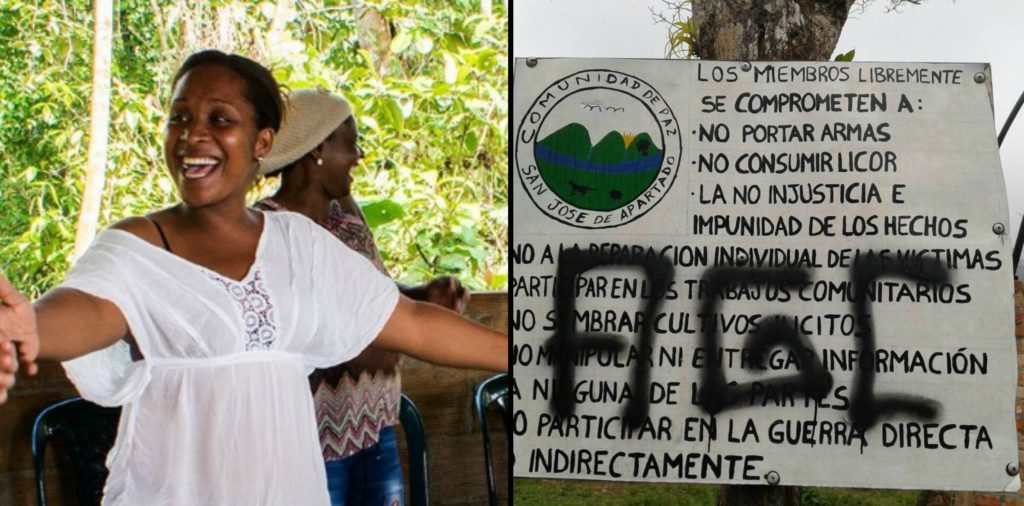
PARAMILITARY ADVANCES THREATEN IMPLEMENTATION AGREEMENTS IN COLOMBIA
Three months after the signature of the final peace agreement in Colombia, legislators continue to work non-stop to finalize its effective implementation. Across several provinces, however, paramilitary groups have started to fill the empty spaces left by the withdrawal of FARC forces, and are now generating a wave of violence that has left, since the beginning of the year, 23 social leaders murdered, including peace and human rights defenders.
The signing of the new peace agreements, on November 24, 2016, marked in fact only the first step towards the stabilization of Colombia and the transformation of FARC from an illegal armed group to a legitimate political movement. It is in this context that one should see the work by the civic movement “Voces de Paz y Reconciliación”, whose purpose is to monitor that the agreement is not overturned as it passes through the Colombian Congress. The approval process has indeed been officially fast-tracked, with Parliament authorized by the Constitutional Court to create, within six months of the agreement’s signature, the laws for its implementation. Until now, however, only the Amnesty Law has been approved, while the debate on the Special Jurisdiction for Peace—with its own tribunal, truth commission and missing persons search unit—is still ongoing. Ultimately, the credibility and legitimacy of the peace deal will largely depending on how much attention is given to the conflict’s victims and the issue of impunity.
As for the agreement’s implementation in the field, this past weekend the last FARC contingent demobilized, completing the movement of more than 6.900 guerrilla fighters in demobilization zones known as Zonas Veredales Transitorias de Normalización (ZVTN). These are the areas where the gradual disarmament of rebel forces will take place until the agreed June 1st deadline. Current analysis indicates, however, a complex scenario characterized by a general delay in the implementation agreement phase. The conditions of the temporary camps are precarious in relation to infrastructure, health care and residents’ basic rights. Aside from the logistical aspects, guerrilla members are not convinced by what they see as insufficient security guarantees following disarmament. And they are also weary of government negligence, which has been denounced by the campaign #VengaEsaManoPorLaPaz, promoted by civil society organizations to safeguard the agreement’s implementation.
The murder of social leaders in various zones of the country remains, however, the most fundamental contradiction of the current ‘negative peace’, which has been characterized by the absence of war and validity of the bilateral ceasefire. Human rights organizations are concerned about the current situation: there have been 20 assassinations in the month of January alone, following the 117 human rights defenders killed in Colombia in 2016. The targets are leaders committed to peacebuilding across rural provinces and members of the political movement Marcha Patriótica.
While the civilian casualties of open conflict are thus decreasing, we are witnessing a resurgence of attacks against peace constituencies or, in other terms, against those civil society members committed to reconciliation and to the establishment of sustainable peace through community-comprehensive and bottom-up human rights defense approaches. Amongst those social leaders killed, there is Emilsen Mayoma of Communities Building Peace in the Territories (CONPAZ), an organization working to document cases of forced disappearances on behalf of the Truth Commission in the city of Buenaventura. Similarly, the Peace Community of San José de Apartadò, a rural non-violent movement in Antioquia, is also under attack.
In the same region, the murder of José Yimer Cartagena Úsuga, a member of Marcha Patriótica points to the advancement of the paramilitary group Autodefensas Gaitanistas de Colombia (AGC) in areas where FARC is withdrawing and where the special peace electoral districts are to be instituted. These areas are going to be crucial for political calculations in the next elections. The murder raised the number of Marcha Patriótica members killed in the last 5 years to 129, a statistic that supports the hypothesis that the movement is the victim of systematic persecution—although this is strongly denied by authorities.
“A concrete example of problems Colombia is facing in the transition phase towards peace is that some military groups are likely to move into areas once held by FARC and to take control through violence”, stated the United Nations Secretary Antonio Guterres, after the presentation of the latest report on the UN Mission in Colombia.
It indeed appears that the AGC aims to have full control over the population, territory and the illegal economy connected to the drug trade. The latest monitoring data by the United Nations Office on Drugs and Crime (UNODC)shows how in some areas, such as Cordoba province, there is indeed an historical peak in the number of hectares with coca cultivation. In this context, the substitution of illicit crops with legal ones, which is proposed in the peace agreement, will not happen from one day to next, while the simple tactic of fumigation is not a suitable answer to the complexity of the problem, as it will negatively affect the local civilian population, whose livelihoods depend on agriculture.
In the meantime, peasant and indigenous social movements continue to organize themselves in order to promote models of bottom-up peacebuilding that are based on social justice. It is with this purpose that the second Foro Construyendo Paz desde Nariño, sponsored by United Nations Development Programme (UNDP), took place in the city of Pasto. The meeting produced the creation of the first Territorio Campesino Agroalimentario, a special area created in the San Pablo municipality (North Nariño) to defend land rights, rural identity and small-scale economy against the threat from the current development approach, centered on mining and agro-industry.
There is also good news regarding the negotiations between the government and the rebel group Ejército de Liberación Nacional (ENL), which has been active since 1964: on February 7 an official negotiating table was launched near the city of Quito. Key to jumpstarting preliminary discussions between the parties will be the expected release of Odín Sánchez Montes de Oca, a former congressman taken hostage by ENL forces nine months ago.
Overall, the Colombian situation will remain critical until the state persists in denying the phenomenon of para-militarism and thus fails to assume its responsibility to protect civilian communities committed to non-violent resistance. According to Jorge Restrepo, the director of Centro de Recursos para el Análisis de Conflictos (CERAC): “it cannot be assumed that the peace process with the FARC cannot be reversed. If there is a government which repudiates the agreements, Colombia can return to conflict”.






























